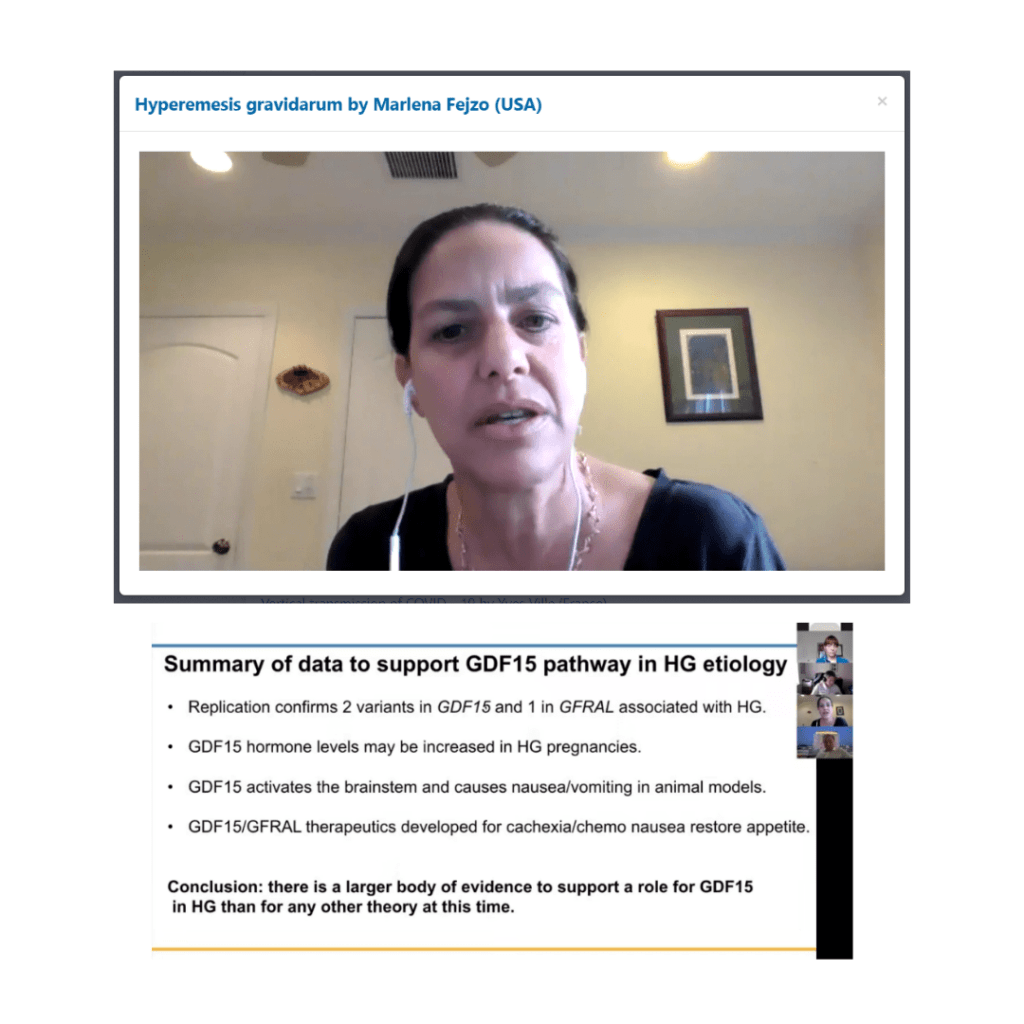Dr. Marlena Fejzo, a geneticist at the University of Southern California and a HER Foundation Board of Directors, presented at the Fetal Medicine Foundation (FMF) about Hyperemesis Gravidarum (HG), its potential causes, and treatment options. Over 5600 medical professionals heard her speak. The talk is freely available on the FMF’s website in English, Spanish, Russian, and Portuguese.
HG and fetal medicine
HG is defined as Nausea and Vomiting of Pregnancy (or NVP) that is severe enough to cause malnutrition, dehydration, and weight loss in pregnant women. These can lead to a variety of secondary effects, including Wernicke’s encephalopathy, dysfunctional liver/kidney/gallbladder, or thromboembolism. Negative effects on the baby can include reduced head circumference and an increased risk of developing autism.
Genetic basis of HG
After going over the many effects and secondary conditions of HG, Dr. Fejzo turned to look at the etiology. Several factors hint at a genetic cause for the disease. HG is highly heritable based on twin studies. A woman whose sister has had HG is 17 times more likely to experience it herself. A genetic basis for HG is a good sign. It discredits old, outdated theories on the cause of HG, reinforces the idea that it’s a physical illness (as opposed to a psychological one), and legitimizes the experiences of women suffering from the disease.

A GWAS, or Genome-Wide Association Study, is a method for correlating specific genes with diseases or other traits that could have a genetic component. Dr. Fejzo and her colleagues got data from over 17,000 participants, and used GWAS to look for genetic differences between people who had gone through HG and those who hadn’t. They identified two different mutations in the gene GDF-15, each linked to HG. GDF-15 encodes a hormone that regulates appetite. It’s produced by the placenta and activates the vomiting center of the brain. In turn, GDF-15 is activated by nutrient deficiency, long-term fasting, or other factors.
Dr. Fejzo theorized that excess GDF-15 in pregnancy may be the result of a positive feedback loop. Women with a genetic variant of the GDF-15 gene start out with a higher “baseline” level of the hormone in their bodies, leading to vomiting during their pregnancy. NVP can often cause nutrient deficiency, and nutrient deficiency (not necessarily related to pregnancy) could activate GDF-15, and in turn cause more vomiting. This may create a vicious cycle, worsening the symptoms until NVP becomes full-blown HG.
Implications for treatment
Prescribing medicines is always a risk-benefit analysis, especially during pregnancy where there can be potential issues for both mother and child. The downsides of medications must always be balanced against the dangers posed by untreated hyperemesis.
The HER Foundation has a variety of tools to aid patients and providers, including the HELP Score to determine the severity of illness, algorithms to help guide providers in prescribing treatments, and a the free HG Care app that patients can use for symptom tracking and easier communication with providers.

